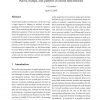Free Online Productivity Tools
i2Speak
i2Symbol
i2OCR
iTex2Img
iWeb2Print
iWeb2Shot
i2Type
iPdf2Split
iPdf2Merge
i2Bopomofo
i2Arabic
i2Style
i2Image
i2PDF
iLatex2Rtf
Sci2ools
BC
2005
2005
Waves, bumps, and patterns in neural field theories
Neural field models of firing rate activity have had a major impact in helping to develop an understanding of the dynamics seen in brain slice preparations. These models typically take the form of integrodifferential equations. Their non-local nature has led to the development of a set of analytical and numerical tools for the study of waves, bumps and patterns, based around natural extensions of those used for local differential equation models. In this paper we present a review of such techniques and show how recent advances have opened the way for future studies of neural fields in both one and two dimensions that can incorporate realistic forms of axo-dendritic interactions and the slow intrinsic currents that underlie bursting behaviour in single neurons.
Related Content
| Added | 15 Dec 2010 |
| Updated | 15 Dec 2010 |
| Type | Journal |
| Year | 2005 |
| Where | BC |
| Authors | Stephen Coombes |
Comments (0)

